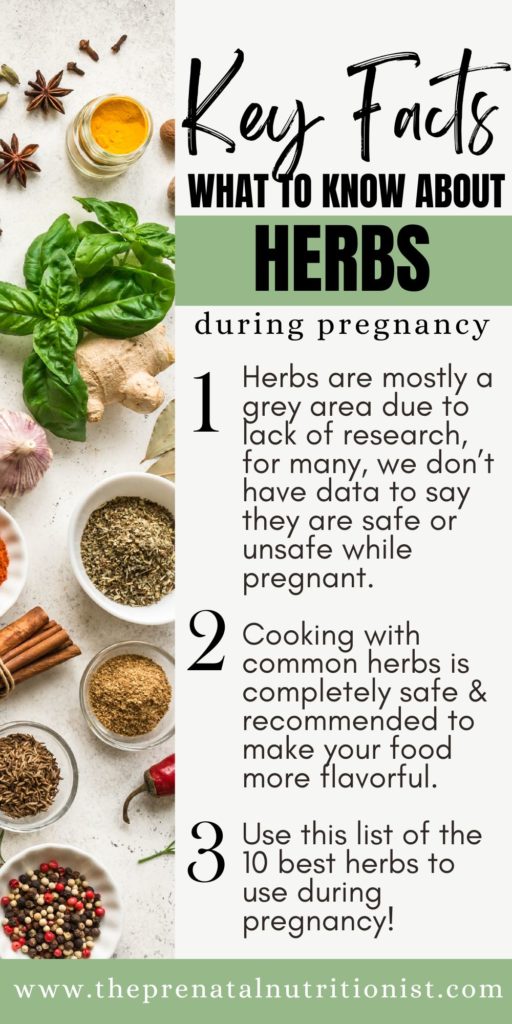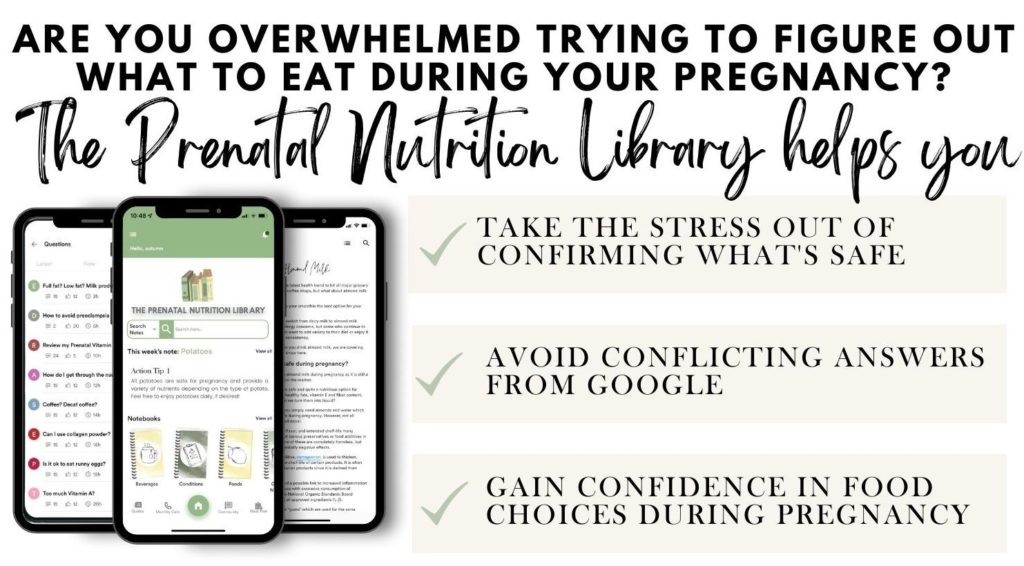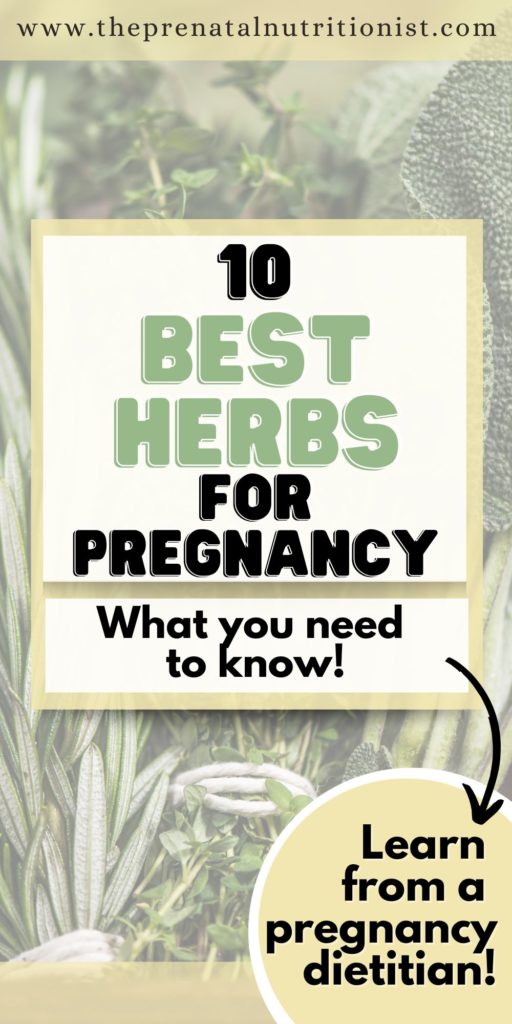
For centuries herbs have been used to flavor foods and in herbal remedies and medicines. There are a wide variety of herbs out there that are safe and effective and support a healthy pregnancy. These various herbs can provide a boost of vitamins, minerals, and antioxidants to your pregnancy diet. Not to mention, they are a delicious and colorful addition to meals and dishes as well.
It’s important to learn which herbs are the safest and healthiest to consume while you await the arrival of your newest addition. Herbs can be a controversial topic in pregnancy. This is because many herbs do not yet have the research data to verify safety during pregnancy or support the claim that some can increase breast milk. Generally speaking, supplementation of most herbs is recommended to avoid for this reason.
However, cooking with herbs in moderate amounts like cilantro, parsley, and thyme is completely safe during pregnancy. And, some herbal teas are safe options when sticking to 1-2 cups per day too! In light of this, let’s go over the top nine best herbs to consume during pregnancy!
Please note, that there are also tons of other great herbs and spices to include in your diet that are mineral rich. This is just a shortlist of a few of these delicious, nutritious, and beneficial options for each trimester of pregnancy!
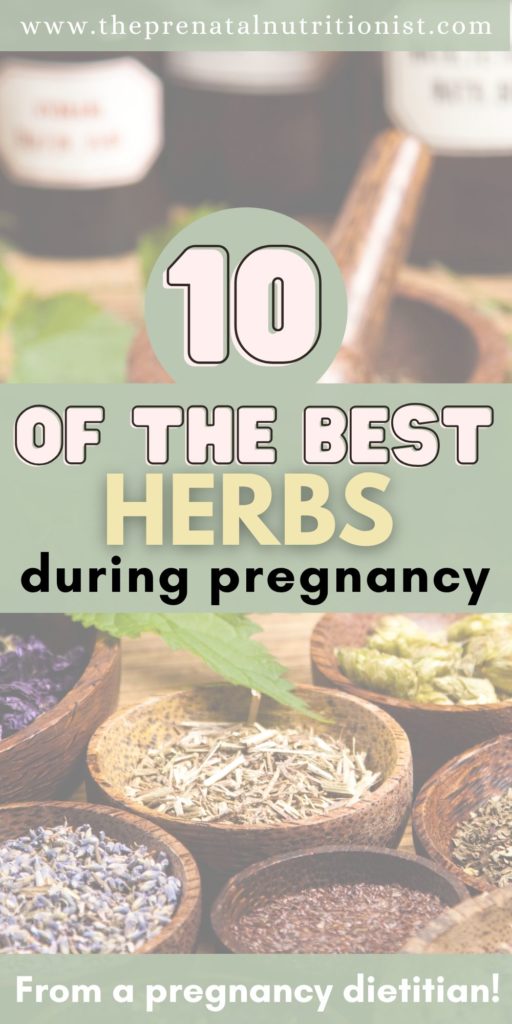
10 Best Herbs During Pregnancy
Red Raspberry Leaf
Red raspberry leaf tea is a popular, caffeine-free herbal tea, due to its suspected benefits for reducing labor time and stimulating the uterus muscles. And, doesn’t it just sound yummy? Red raspberry leaf is rich in antioxidants and polyphenols, including flavonoids. It’s also a rich source of vitamin C, B vitamins, and minerals like magnesium and zinc. There is a common myth that it can induce labor, but there is no evidence to support this.
For more drink/tea ideas during pregnancy, check out our top ten best drinks for early pregnancy.
Nettle Leaf
Like the red raspberry leaf mentioned above, nettle leaf is also best consumed through tea and should be consumed in moderation. Stick with a maximum of 1-2 cups per day. But, what is so special about this tea? Well, one of the big benefits is that nettle is rich in polyphenols. These are beneficial for overall health and reducing inflammation. It’s also a source of vitamins and minerals like iron and calcium. And, it may help to reduce blood sugar levels!
Peppermint
First, is peppermint safe to consume during pregnancy? The answer is that it depends.
The form is important to consider. Peppermint can be found in many forms including leaves, oils, extracts, and tea. Peppermint is not recommended in large quantities and should not be taken as a supplement unless otherwise recommended by your physician. It’s also important to note that peppermint tea can exacerbate acid reflux and heartburn symptoms for some individuals. However, consuming peppermint-flavored foods, tea, and candies in moderation is generally safe to enjoy! These types of foods and drinks may help to alleviate nausea and even headaches.
Ginger Root
Ginger is one of the most popular herbs used worldwide. This herb is a rich source of antioxidants, mainly due to the active component, gingerol. And it may also help to strengthen the immune system and lower blood pressure. Like peppermint tea, ginger is helpful in relieving nausea and symptoms of morning sickness for some individuals. Not sure how to incorporate ginger root into your pregnancy diet?
This herb is a delicious and nutritious seasoning for almost any stir-fry dish or over oven-roasted vegetables. It can also be consumed in the form of tea. There is no conclusive evidence to support recommending ginger supplementation during pregnancy although you may find small amounts in some prenatal vitamins. Try a cup of ginger tea or ginger chews for treating nausea.
Lemon Balm
Lemon balm is actually an herb in the mint family. It takes on a delicious and refreshing taste when boiled for tea. During pregnancy, it’s common to be stressed. I mean growing a tiny human, preparing for a baby, and navigating this journey – it’s a lot. If you find yourself stressing, try grabbing yourself a calming cup of lemon balm tea. Lemon balm tea may also help reduce gas and heartburn.
Oat Straw
Treat your irritated skin, inflammation, stress, and overwhelm with oat straw. Evidence is lacking but other proposed potential benefits during pregnancy include possibly reducing the risk of varicose veins and strengthening those capillaries, i.e. better blood flow. Capillaries are blood vessels in the body that help transport blood to and from the heart. They directly assist in the transportation of blood to your growing baby.
Ready to incorporate this herb into your diet? Mostly in tea form, it is best, but you can add this herb to oatmeal, overnight oats, acai bowls, smoothies, and shakes.
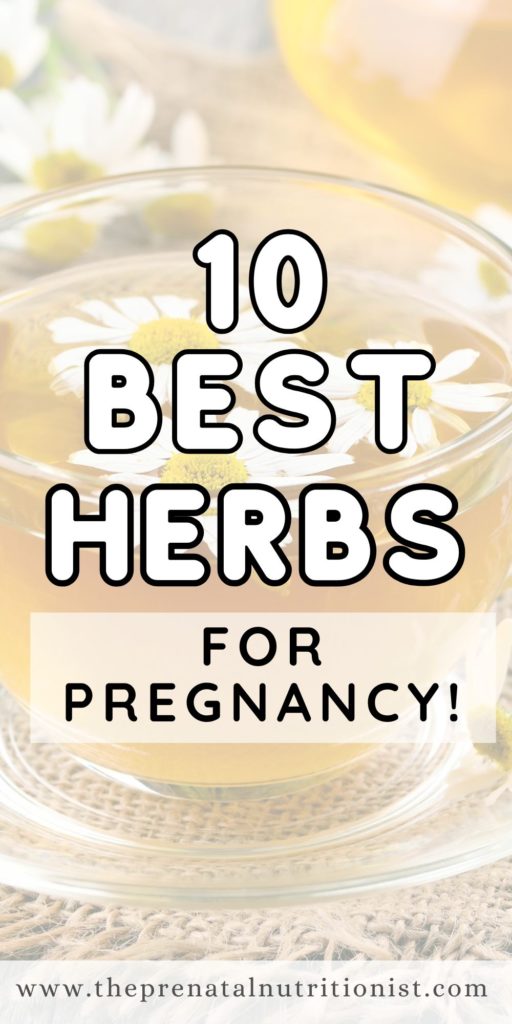
Garlic
Yummmm…who doesn’t just love garlic? This herb is so delicious and pairs well with almost all meats, pasta, and vegetables. Thus, it’s super easy to find ways to incorporate this one into your pregnancy diet. Garlic may help to reduce blood pressure, decrease fasting blood glucose, and fight colds. Feel free to slice up 2-4 cloves of garlic and add them on top of salmon, chicken, or beef before or after cooking.
Cranberry
The cranberry fruit is very commonly used by expectant mothers, including in herbal teas and remedies. According to this research, cranberries may help reduce the risk of preterm labor, low birth weight, anemia, and hypertension.
When it comes to vitamins and minerals, cranberries are a rich source of vitamin C. They also contain small amounts of vitamin B6, iron, and magnesium. To add this herb to your diet, try drinking some cranberry tea. You can also feel free to add the raw fruit to your next smoothie or shake! The cranberry fruit provides a good boost of fiber too.
Thyme
Thyme is a well-known safe herb used to season meat, soups, pasta, beans, and vegetables. It has a bit of peppery flavor. Thyme also pairs well with other herbs and spices. This herb is full of antioxidants to reduce free radicals and is also thought to help reduce nausea and gas. Although I wouldn’t count it towards your daily quota of these nutrients, it is also a source of vitamins and minerals such as potassium and vitamin C. While pregnant, thyme is safe to consume while cooking, but should not be taken as a supplement.
Rosemary
Thyme is another well-known herb that comes from an evergreen shrub and is part of the mint family. It is an herb that is used commonly as a seasoning in foods, fragrances, and medicinal purposes. Rosemary is safe if used correctly during pregnancy. Cooking with Rosemary is safe, however, should only be ingested in a dried or whole form, not as an oil. Rosemary has some health benefits like antimicrobial and antioxidant properties that make it great for cooking and marinades. It is safe to be safe during pregnancy and ingesting large amounts of the supplement form of rosemary may have adverse effects during pregnancy.
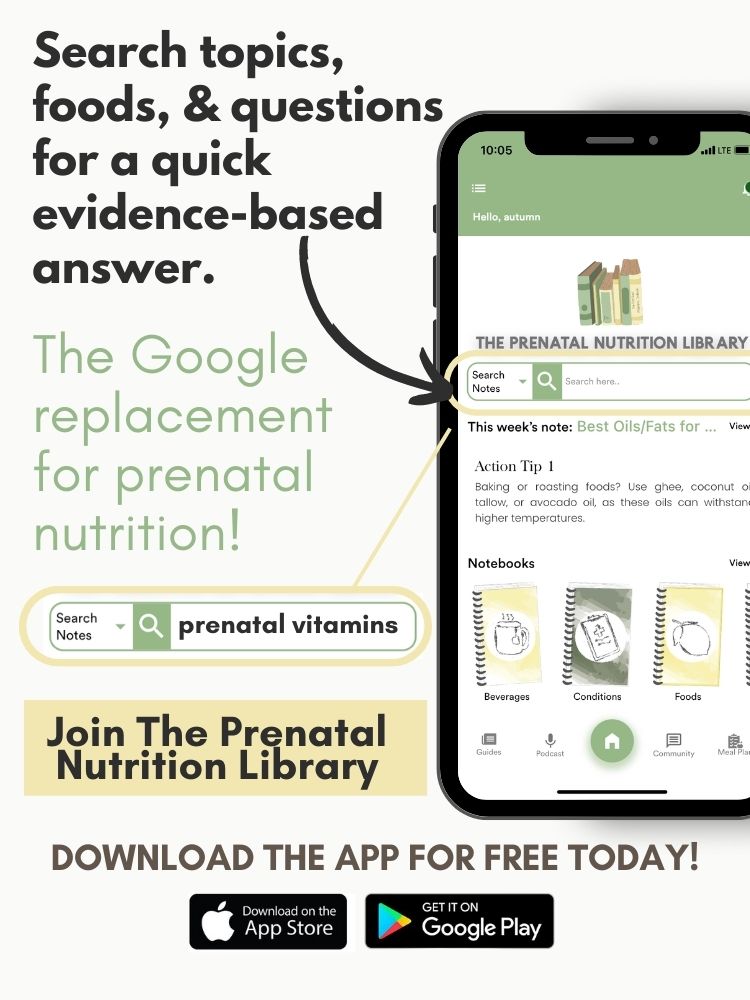
Chamomile
Sitting down with a cup of chamomile tea in the evening can be super relaxing. As most of you probably already know, chamomile is a very common herb most often consumed by way of tea. This tea is well-known for its calming effects and its anti-inflammatory and antioxidant properties. It’s important to note research has shown mixed results on the actual benefits of drinking this tea during pregnancy. As with most foods and drinks, you should consume this tea in moderation to avoid any negative side effects.
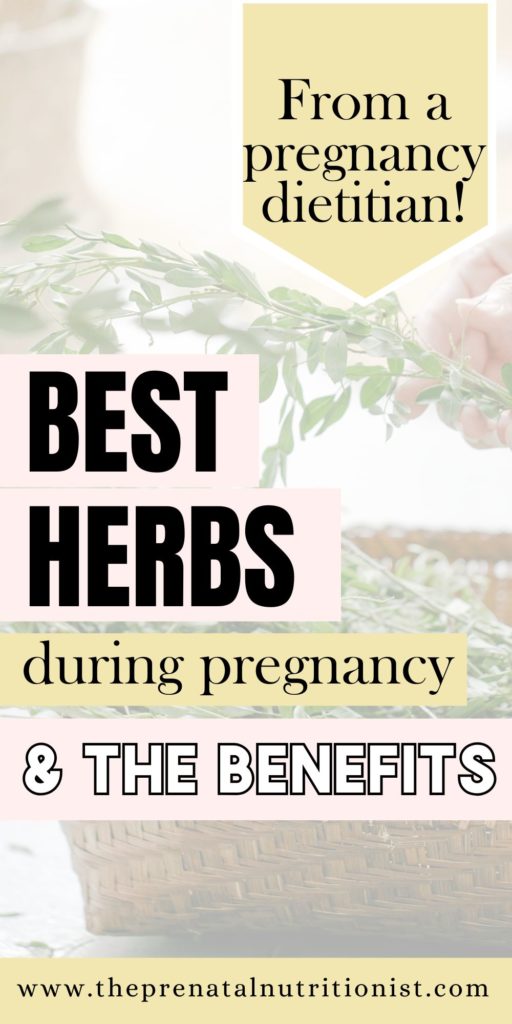
Herbs can provide a great boost and benefits to your pregnancy diet!
Herbs during pregnancy can be a controversial topic for each trimester of pregnancy and breastfeeding. Rest assured, cooking with herbs in normal amounts is completely safe and effective. The question marks on the intake of herbs come into play with supplementation. Many herbs lack enough research on safety during pregnancy to be able to confirm high doses, like those found in supplements, are safe or unsafe. I’d recommend sticking with food amounts and safe herbal teas and use herbal medicine with caution unless your doctor, healthcare provider, or dietitian says otherwise.
We hope this article has helped provide some answers to your questions on herbs during pregnancy. To learn more about herbal teas, pregnancy teas, green tea, and other pregnancy nutrition topics join The Prenatal Nutrition Library.
You can also download our app for FREE to get a sneak peek inside the library before joining. As always, if you have any additional questions or comments, feel free to drop a comment below. We love hearing from our readers and answering all your burning questions!
